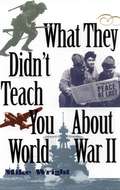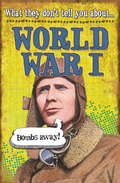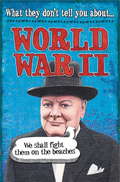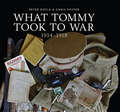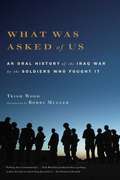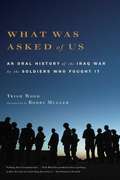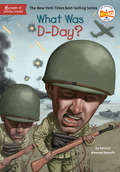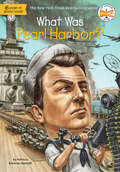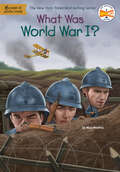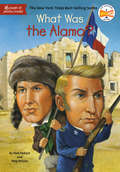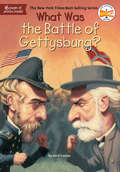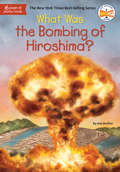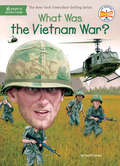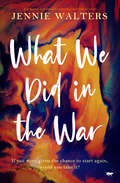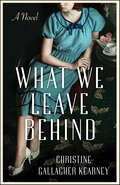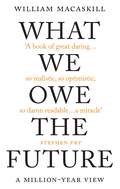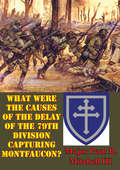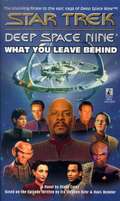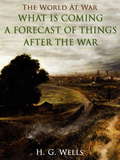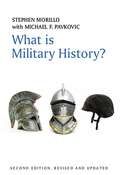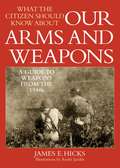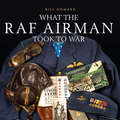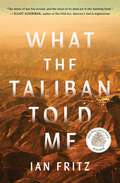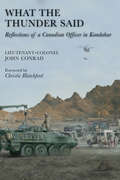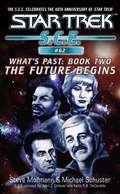- Table View
- List View
What They Didn't Teach You About World War II (What They Didnt Teach You)
by Mike WrightProvides a different view of World War II.
What They Don't Tell You About: World War I
by Robert FowkeThis book explains how the war started, what it was about and who it involved. It describes the major battles and looks at what life was like for the soldiers in the trenches, the pilots in the air, the sailors at sea and the civilians back home. Written in the lively style common to this series, the author deals with this difficult subject in a sensitive and skilful manner, introducing humour only where appropriate. With black line illustrations throughout.
What They Don't Tell You About: World War II
by Robert FowkeDid you know that Adolf Hilter wasn't, in fact, German? The Second World War brought horror and heartache to millions of people all over the globe, and it turned everyday living upside down too. Any history book will give you the boring facts THEY think you should know, but only this one will tell you what life during World War II was REALLY like ...
What Tommy Took to War: 1914-1918
by Peter DoyleA century may now have passed since the Great War, but the stories of everyday soldiers serving in miserable and life-threatening conditions still have a sobering sense of immediacy. Personal records, photographs and sentimental possessions that bring us even closer to the soldier as a person have often become valuable heirlooms, passed down through the generations. Nothing better depicts an individual soldier than these items, which were kept about his person and in his kitbag, and which constituted all his worldly possessions while on service in the trenches. This book looks at fifty objects with which every Tommy would have been familiar, from official uniform and equipment to good-luck charms and letters from sweethearts. With each artifact – be it an identity disc, training manual, packet of cigarettes, postcard or foreign phrasebook – the accompanying text explains the significance of all the things that, together, help to define him both as a man and as a soldier.
What Was Asked of Us: An Oral History of the Iraq War by the Soldiers Who Fought It
by Trish Wood Bobby Muller"A visceral account of the war ... honest, agenda-free, and chilling." - New York Times Book Review. The Iraq war officially began on March 20, 2003, and since then more than one million young Americans have rotated through the country's insurgent-infested hot spots. But although stories of dramatic ambushes and attacks dominate the front pages of newspapers, most of us do not truly know what the war is like for the Americans who fight it. What Was Asked of Us helps us bridge that gap.The in-depth and intensely probing interviews this book brings together document the soldiers' experiences and darkest secrets, offering a multitude of authentic, unfiltered voices - at times raw and emotional, at other times eloquent and lyrical. These voices walk us through the war, from the successful push to Baghdad, through the erroneous "Mission Accomplished" moment, and into the dangerous, murky present. "Monumental ... Amid the glut of policy debates, and amid the flurry of news reports that add names each day to the lists of the dead, Trish Wood has produced what is perhaps, to date, the only text about Iraq that matter."- San Francisco Chronicle. "An illuminating glimpse of American fighters' experiences in Iraq ... There are moments of strange beauty in the soldiers' recollections." - Chicago Tribune. "Stunning ... chillingly eloquent ... Powerful and unflinchingly honest, Wood's book deserves to be a bestseller." -People.
What Was Asked of Us: An Oral History of the Iraq War by the Soldiers Who Fought It
by Trish Wood"A visceral account of the war ... honest, agenda-free, and chilling." New York Review of Books. The Iraq war officially began on March 20, 2003, and since then more than one million young Americans have rotated through the country's insurgent-infested hot spots. But although stories of dramatic ambushes and attacks dominate the front pages of newspapers, most of us do not truly know what the war is like for the Americans who fight it. What Was Asked of Us helps us bridge that gap. The in-depth and intensely probing interviews this book brings together document the soldiers' experiences and darkest secrets, offering a multitude of authentic, unfiltered voices--at times raw and emotional, at other times eloquent and lyrical. These voices walk us through the war, from the successful push to Baghdad, through the erroneous "Mission Accomplished" moment, and into the dangerous, murky present. "Monumental. ... Amid the glut of policy debates, and amid the flurry of news reports that add names each day to the lists of the dead, Trish Wood has produced what is perhaps, to date, the only text about Iraq that matter."--San Francisco Chronicle. "An illuminating glimpse of American fighters' experiences in Iraq ... There are moments of strange beauty in the soldiers' recollections."--Chicago Tribune. "Stunning ... chillingly eloquent. ... Powerful and unflinchingly honest, Wood's book deserves to be a bestseller."--People
What Was D-Day?
by Scott Anderson Patricia Brennan Demuth David Grayson KenyonIn the early morning hours of June 6, 1944, an armada of 7,000 ships carrying 160,000 Allied troops stormed the beaches of Nazi-occupied France. Up until then the Allied forces had suffered serious defeats, yet D -Day, as the invasion was called, spelled the beginning of the end for Nazi Germany and the Third Reich. Readers will dive into the heart of the action and discover how it was planned and carried out and how it overwhelmed the Germans who had been tricked into thinking the attack would take place elsewhere. D-Day was a major turning point in World War II and hailed as one of the greatest military attacks of all time.
What Was Pearl Harbor? (What Was?)
by Patricia Brennan DemuthA terrifying attack! On December 7, 1941, Japanese war planes appeared out of nowhere to bomb the American base at Pearl Harbor in Hawaii. It was a highly secretive and devastating attack: four battleships sunk, more than two thousand servicemen died, and the United States was propelled into World War II. In a compelling, easy-to-read narrative, children will learn all about a pivotal moment in American history. .
What Was World War I? (What Was?)
by Nico Medina Who HQThis compelling addition to the What Was? series covers what was supposed to be &“the war to end all wars&” but tragically wasn't.In 1914, the assassination of an Austrian archduke set off a disastrous four-year-long conflict involving dozens of countries with battles taking place in all parts of the world. World War I was the first to use planes and tanks as well as deadly gases that left soldiers blinded or &“shell shocked&” (a condition now called Post Traumatic Stress Syndrome). There were battles that lasted for months with opposing troops fighting from rat-infested trenches, battles that often ended in a hollow victory with only a small area of land retaken. The author of many successful Who HQ titles Nico Medina gives young readers a clear and compelling account of this long and tragic event, a war that left over 20 million dead and was the lead-up to World War II barely twenty years later.
What Was the Alamo?
by David Groff Meg Belviso Pamela D. Pollack"Remember the Alamo!" is still a rallying cry more than 175 years after the siege in Texas, where a small band of men held off about two thousand soldiers of the Mexican Army for twelve days. The Alamo was a crucial turning point in the Texas Revolution, and led to the creation of the Republic of Texas. With 80 black-and-white illustrations throughout and a sixteen-page black-and-white photo insert, young readers will relive this famous moment in Texas history.
What Was the Battle of Gettysburg? (What Was?)
by Who HQ Jim O'Connor"Four score and seven years ago..." begins Abraham Lincoln's beautiful speech commemorating the three-day battle that turned the tide of the Civil War. The South had been winning up to this point. So how did Union troops stop General Robert E. Lee's invasion of the North? With black-and-illustrations throughout and sixteen pages of photos, this turning point in history is brought vividly to life.
What Was the Bombing of Hiroshima? (What Was?)
by Jess Brallier Who HQHiroshima is where the first atomic bomb was dropped. Now readers will learn the reasons why and what it's meant for the world ever since.By August 1945, World War II was over in Europe, but the fighting continued between American forces and the Japanese, who were losing but determined to fight till the bitter end. And so it fell to a new president--Harry S. Truman--to make the fateful decision to drop two atomic bombs--one on Hiroshima and one on Nagasaki--and bring the war to rapid close. Now, even seventy years later, can anyone know if this was the right choice? In a thoughtful account of these history-changing events, Jess Brallier explains the leadup to the bombing, what the terrible results of it were, and how the threat of atomic war has colored world events since.
What Was the Vietnam War? (What Was?)
by Jim O'Connor Who HQLearn how the United States ended up fighting for twenty years in a remote country on the other side of the world.The Vietnam War was as much a part of the tumultuous Sixties as Flower Power and the Civil Rights Movement. Five US presidents were convinced that American troops could end a war in the small, divided country of Vietnam and stop Communism from spreading in Southeast Asia. But they were wrong, and the result was the death of 58,000 American troops. Presenting all sides of a complicated and tragic chapter in recent history, Jim O'Connor explains why the US got involved, what the human cost was, and how defeat in Vietnam left a lasting scar on America.
What We Did in the War
by Jennie WaltersCan you ever let go of the past? Two women unhappy with their lives seize a chance to start over during a WWII bombing raid, in this dramatic and suspenseful novel. London, 1944: As bombs start raining from the sky, two women rush out of a restaurant, leaving their possessions behind. Their chance meeting amid the chaos and destruction will have long-lasting consequences. Both beset by desperate problems, they take advantage of the wartime chaos to escape their humdrum lives and start again. Sticking together, the pair live under the radar, using a stolen ration book to feed themselves and relying on a street kid&’s help to get by. Cecil eventually finds work, while glamorous, feckless Claude looks after the flat—or doesn&’t. Gradually their friendship sours and resentment creeps in. Just as Cecil is wondering whether she should ever have trusted Claude in the first place, she makes a shocking discovery—one that will expose a web of secrets, lead to an act of violence, and set the two on separate and very different paths.Praise for The Clockmaker&’s Wife, written by the author under the name Daisy Wood: &“A ticking time-bomb of intrigue, wrapped around stark but rich descriptions of the Blitz. An unforgettable wartime debut.&” —Mandy Robotham, international bestselling author of The Berlin Girl
What We Leave Behind: A Novel
by Christine Gallagher KearneyIn 1947, war bride Ursula arrives in Minneapolis torn between guilt over leaving loved ones behind and her desire to start a new life—and a family—in this promised land. But the American dream proves elusive—she is struck with polio, and then shocked by the sudden death of her GI husband. Without a spouse or the child she so desperately wanted, Ursula must rely on her shrewd survival skills from wartime Berlin, and she takes in a boarder to help make ends meet. She soon falls in love with the Argentinean medical technician living in her spare bedroom, but his devotion to communism troubles her—and when she finds herself pregnant with his child, she is faced with a dilemma: how to reconcile her dream of motherhood with an America that is so different from what she imagined.
What We Owe The Future: The Sunday Times Bestseller
by William MacAskillThe challenges we face are enormous. But we can still secure a positive future for our planet, and for everyone on it. In What We Owe The Future, philosopher William MacAskill persuasively argues for longtermism, the idea that positively influencing the distant future is a moral priority of our time. It isn&’t enough to mitigate climate change or avert the next pandemic. We can ensure that civilization would rebound if it collapsed; cultivate value pluralism; and prepare for a planet where the most sophisticated beings are digital and not human. 'Unapologetically optimistic and bracingly realistic, this is the most inspiring book on &‘ethical living&’ I&’ve ever read.' Oliver Burkeman, Guardian &‘A monumental event.' Rutger Bregman, author of Humankind &‘A book of great daring, clarity, insight and imagination. To be simultaneously so realistic and so optimistic, and always so damn readable… well that is a miracle for which he should be greatly applauded.&’ Stephen Fry
What Were The Causes Of The Delay Of The 79th Division Capturing Montfaucon?
by Major Paul B. Mitchell IIIOn the opening day of the Meuse-Argonne Offensive of World War I, the newly-created United States 79th Division was templated to advance nine kilometers through German-controlled terrain. However, the advance through the first four kilometers, which included the German strong point of Montfaucon, took two days. The slowed advance of the 79th Division is credited with slowing the progress of the entire American Expeditionary Forces' First Army, thus allowing time for Germans to react to the surprise American offensive. Thus, the central research question is: What were the factors that caused the delay of the 79th Division in their capture of Montfaucon? Little research has been completed on this subject, and most historians pinpoint the sole cause as inexperience on the part of the 79th Division. Therefore, an analysis will be conducted which takes into account the training received by the 79th Division in the United States, the training received in France, and other factors that influenced the outcome of the battle.
What You Leave Behind
by Diane CareyA powerful novel in the classic tradition of All Good Things... Seven years ago, Benjamin Sisko took command of an alien space station newly christened Deep Space Nine . There he met Kira Nerys, Odo, Miles O'Brien, Quark, Worf, Julian Bashir, and many others who would touch his life deeply. He also found a new and troubling destiny as the long-awaited Emissary to the mysterious wormhole entities known as the Prophets. Now, after years of triumph and tragedy, and a cataclysmic war that rocked the entire Alpha Quadrant, Captain Sisko and his valiant crew face their final challenge. No one is safe, nothing is certain, and not even the Prophets can predict the ultimate fate of Deep Space Nine!
What is Coming? A Forecast of Things after the War (The World At War)
by H. G. WellsProphecy may vary between being an intellectual amusement and a serious occupation; serious not only in its intentions, but in its consequences. For it is the lot of prophets who frighten or disappoint to be stoned. But for some of us moderns, who have been touched with the spirit of science, prophesying is almost a habit of mind. (Excerpt from book)
What is Military History? (2nd Edition)
by Stephen Morillo Michael F. PavkovicThis refreshed and updated second edition shows that military history encompasses not just accounts of campaigns and battles but includes a wide range of perspectives on all aspects of past military organization and activity.
What the Citizen Should Know About Our Arms and We: A Guide to Weapons from the 1940s
by James E. HicksOriginally published in 1941, this book of military ordnance was written in order to bring information to the non-military public during the time of uncertainty that marked the beginnings of the United States’ involvement in World War II. This volume was originally meant to bring comfort and understanding to the average citizen. Thorough in its scope, What the Citizen Should Know About Our Arms and Weapons covers such weapons as: * Pistols and revolvers * Muskets * Grenades and mortars * Field artillery * Antiaircraft artillery * And much more! Ideal for any military history buff, What the Citizen Should Know About Our Arms and Weapons is a straightforward look at the military practices of a nation on the brink of war. Skyhorse Publishing, as well as our Arcade imprint, are proud to publish a broad range of books for readers interested in history--books about World War II, the Third Reich, Hitler and his henchmen, the JFK assassination, conspiracies, the American Civil War, the American Revolution, gladiators, Vikings, ancient Rome, medieval times, the old West, and much more. While not every title we publish becomes a New York Times bestseller or a national bestseller, we are committed to books on subjects that are sometimes overlooked and to authors whose work might not otherwise find a home.
What the RAF Airman Took to War
by Bill HowardBetween July and October 1940, in what became known as the Battle of Britain, a nation held its breath while the pilots of the Royal Air Force battled Hitler's Luftwaffe in the skies above England. Many lost their lives in this hard-fought episode and in the four years of air campaigns that followed. As Prime Minister Winston Churchill put it, "Never was so much owed by so many to so few." In this beautifully illustrated tribute to "The Few," Bill Howard catalogs the objects upon which every wartime pilot depended, from the superstitious good-luck charm to the parachute on which his life may depend, and other poignant items relating to the air war.
What the Taliban Told Me
by Ian FritzAn &“essential&” (Kevin Maurer, #1 New York Times bestselling author) memoir of a young Air Force linguist coming of age in a war that is lost.When Ian Fritz joined the Air Force at eighteen, he did so out of necessity. He hadn&’t been accepted into colleges thanks to an indifferent high school career. He&’d too often slept through his classes as he worked long hours at a Chinese restaurant to help pay the bills for his trailer-dwelling family in Lake City, Florida. But the Air Force recognizes his potential and sends him to the elite Defense Language Institute in Monterey, California, to learn Dari and Pashto, the main languages of Afghanistan. By 2011, Fritz was an airborne cryptologic linguist and one of only a tiny number of people in the world trained to do this job on low-flying gunships. He monitors communications on the ground and determines in real time which Afghans are Taliban and which are innocent civilians. This eavesdropping is critical to supporting Special Forces units on the ground, but there is no training to counter the emotional complexity that develops as you listen to people&’s most intimate conversations over the course of two tours, Fritz listens to the Taliban for hundreds of hours, all over the country night and day, in moments of peace and in the middle of battle. What he hears teaches him about the people of Afghanistan—Taliban and otherwise—the war, and himself. Fritz&’s fluency is his greatest asset to the military, yet it becomes the greatest liability to his own commitment to the cause. Both proud of his service and in despair that he is instrumental in destroying the voices that he hears, What the Taliban Told Me is a &“fraught, moving&” (Kirkus Reviews) coming-of-age memoir and a reckoning with our twenty years of war in Afghanistan.
What the Thunder Said: Reflections of a Canadian Officer in Kandahar
by Christie Blatchford Colonel John ConradBy every principle of war, every shred of military logic, logistics support to Canada's Task Force Orion in Afghanistan should have collapsed in July 2006. There are few countries that offer a greater challenge to logistics than Afghanistan, and yet Canadian soldiers lived through an enormous test on this deadly international stage - a monumental accomplishment. Canadian combat operations were widespread across southern Afghanistan in 2006, and logistics soldiers worked in quiet desperation to keep the battle group moving. Only now is it appreciated how precarious the logistics operations of Task Force Orion in Kandahar really were. What the Thunder Said is an honest, raw recollection of incidents and impressions of Canadian warfighting from a logistics perspective. It offers solid insight into the history of military logistics in Canada and explores in some detail the dramatic erosion of a once-proud corner of the army from the perspective of a battalion commander.
What's Past: Book 2: The Future Begins (Star Trek #62)
by Michael Schuster Steve MollmannWHAT'S PAST A special six-part S.C.E. event that flashes back to previous adventures of the S.C.E. crew from the 23rd century to the height of the Dominion War, with special guests from all across the Star Trek universe! 2375: After being rescued from the U.S.S. Jenolen by the crew of the Starship Enterprise™, Captain Montgomery Scott found himself seventy-five years removed from the time he knows, a twenty-third-century engineer now living in the twenty-fourth. Now he serves as the liaison between the Starfleet Corps of Engineers and the admiralty, supervising the S.C.E.'s mission assignments. But Scott's transition into a new century is not an easy one. The horrors of the Dominion War in particular bring about a crisis of conscience that leads Scotty from the strife-torn world of Kropasar to the pleasure planet of Risa, where encounters with Admirals Alynna Nechayev and William Ross, Ensign Robin Lefler, and Lefler's mysterious mother lead Scotty to a momentous decision....
